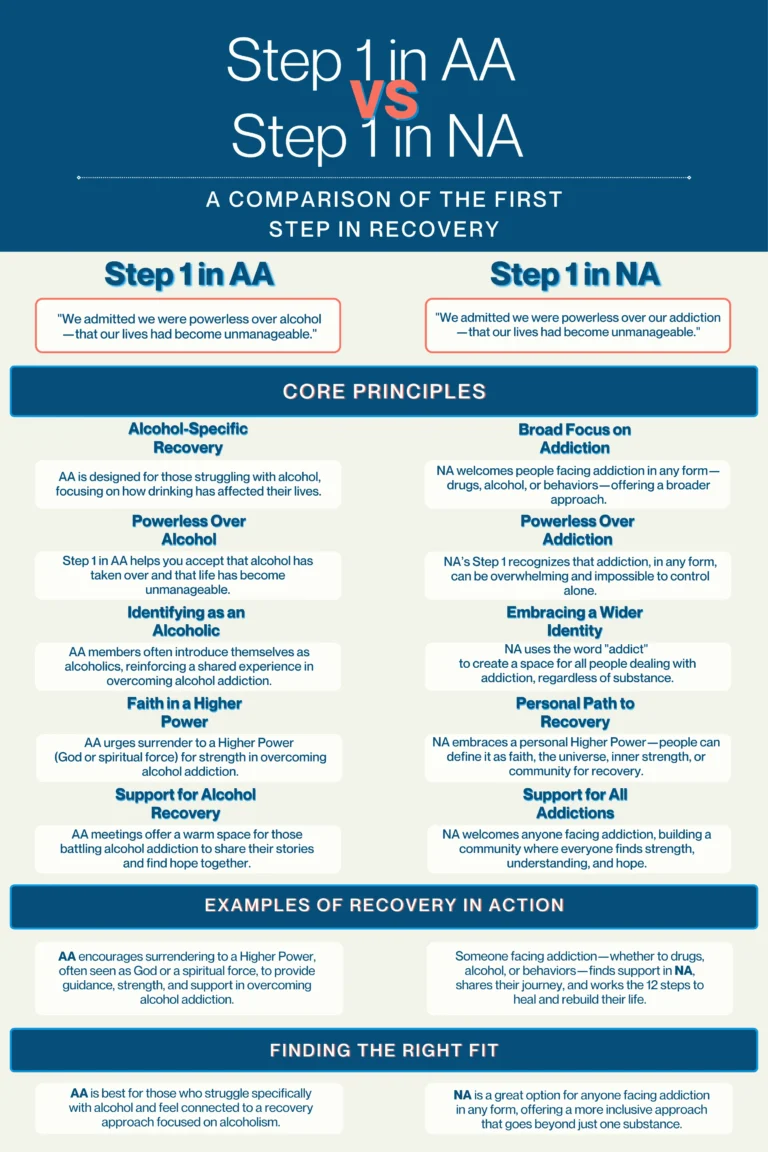Step 1 is a major turning point in recovery, asking you to face the truth about your drinking or substance use with honesty. Letting go of the idea that you can recover from addiction alone is not only difficult, but it is the starting point for true transformation.
While Step 1 in AA focuses on alcohol, Step One in NA covers all forms of addiction, and both emphasize the importance of surrender. Though challenging, accepting powerlessness opens the door to healing, growth, and a fresh start.
Take Your First Step to Recovery Today
Learn more about how our programs combine both the 12 Steps and Therapy and why it works!

What Is Step 1 in AA and NA?
The journey to recovery starts with honesty, and Step 1 in AA and Step One of NA captures that:
AA Basic Text:
“We admitted we were powerless over alcohol—that our lives had become unmanageable.”
(Chapter: How It Works, Page: 59)1
NA Basic Text:
“We admitted that we were powerless over our addiction, that our lives had become unmanageable.”
(Chapter: Step One)2
Step 1 Principle: Honesty
The first step of AA and NA requires complete honesty with yourself. You admit that addiction has taken control and that your life has become unmanageable. Facing this hard truth is a solid starting point for your healing.
How to Practice Honesty:
- Acknowledge the reality of your addiction.
- Recognize the true pain that it has caused.
- Accept that you need help to recover.
Why Admitting Powerlessness Is Important
Admitting one’s weakness is perhaps the scariest part of the journey but also one of the most important. Most avoid this turning-point moment, associating weakness and failing with powerlessness. In reality, recognizing your shortcomings is one of the greatest strengths— it means you’re ready to stop fighting a battle you can’t win alone.
When you admit that addiction has taken control, you free yourself from the illusion that you can manage it on your own. This act of surrender is not defeat; instead, it signals the beginning of true transformation and the door opener for the support and intervention you deserve.
Common Challenges of Step 1 in AA and NA
Step 1 can bring up a lot of emotions, and it is not uncommon to struggle with certain feelings along the way. Some of the most common challenges that can come up are:
- Denial – It’s hard to accept that addiction has taken over, especially if you’ve convinced yourself that you’re still in control.
- Fear – The idea of giving up drugs, alcohol, or the habits that have helped you cope can be scary.
- Shame – Many people feel guilty or embarrassed about their addiction and have a hard time not blaming themselves.
- Doubt – You might ask yourself whether recovery is even possible or if the 12 Steps will even work for you.
Talking with others in recovery, being honest with yourself, and finding a way to forgive yourself can help you overcome these challenges and embrace the journey ahead.
Quick Tip: Embracing Step 1 in AA & NA for Lasting Change
How to Work Through Step 1 Successfully
Step 1 is not just a statement—it’s a process. Accepting powerlessness takes time, and there are many ways to work through it.
- Go to Meetings – Hearing others’ stories reminds you that you’re not alone and that recovery is possible.
- Be honest with yourself – Take a hard look at how addiction has affected your life. Writing it down can help.
- Find a sponsor – A sponsor or mentor who’s been through this can help guide you.
- Be kind to yourself – Addiction is a disease, not a moral failing. Give yourself grace as you work through this step.
- Stay open – You may not fully understand Step 1 right away, and that’s okay. Keep showing up and keep trying.
The more effort you put into understanding and embracing Step 1, the stronger your chances for long-lasting recovery will be.
Step 1 in AA vs. Step 1 in NA
Step 1 is where both AA and NA begin, but they approach it differently. AA focuses on alcohol, while NA includes all addictions. This graphic highlights their differences in wording and focus. Knowing these can help you choose the right path for your recovery.

The Meaning of Spirituality with Step 1 in AA & NA
Many people associate the 12 Steps for AA and NA with religion, but Step 1 is not about faith—it’s about surrender. Spirituality in recovery can mean different things to different people.
To some, spirituality is the presence of some sort of higher being. For others, it means trusting in the support of the recovery community or believing in the possibility of change.
The main point is that you’re not alone. Step 1 is about accepting help and believing that healing is possible however you choose to define it.
Moving Forward After Step 1
Step 1 is the beginning of your healing process. In admitting your inability to control the chaos caused by addiction, you take the brave first step toward healing. This is not defeat; instead, it is the doorway to deeper transformation.
Recovery is a journey, not a single moment. Step 1 creates the foundation for lasting change, but true growth comes from continued commitment.
As you move forward, Step 2 introduces hope—the belief that something greater than yourself can guide you toward recovery. Through honesty, support, and self-reflection, you begin to rebuild trust in yourself and in the process.
You don’t have to navigate this journey alone. Lean into the support of a recovery community, a sponsor, or trusted loved ones who will walk this path with you. Each step forward brings you closer to a life filled with purpose, connection, and healing.
Frequently Asked Questions
What does Step 1 in AA mean?
Step 1 is about admitting that addiction has taken control and life has become unmanageable. It is the understanding that willpower alone is not enough and that recovery starts with honesty, surrender, and seeking support from others who understand your struggle.
How do I know if I’m ready for Step 1?
If addiction is causing problems and you can’t stop on your own, you may be ready for Step 1. This is when you realize you can’t handle your addiction by yourself anymore and that real change requires honesty, support, and a new approach.
Do I have to believe in a higher power to do Step 1?
No, Step 1 is about admitting powerlessness, not religion. AA and NA encourage personal interpretations of a higher power, which can mean anything greater than yourself—such as the support of a group, nature, or simply the recovery process itself.
What comes after Step 1 in AA?
Step 2 comes next, focusing on finding hope and believing that change is possible. It encourages you to open your mind to help beyond yourself, whether from a higher power, the support of others, or a new way of thinking and living.
Key Takeaways
- Key Takeaways
- Step 1 is about admitting powerlessness over addiction and recognizing unmanageability.
- Acceptance is the foundation of recovery.
- Facing denial, fear, and shame is part of the process—but support helps.
- Spirituality in Step 1 is personal and open to interpretation.
- Step 1 sets the stage for lasting change.
Take Your First Step to Recovery at Cornerstone
Recovery starts with one brave step, but it’s the commitment to keep moving forward that leads to lasting change. The 12-step journey provides guidance, hope, and a pathway to healing—one step at a time. If you or a loved one is struggling, you don’t have to go through it alone.
Cornerstone Healing Center offers a range of addiction treatment programs, including residential treatment, outpatient services, and virtual options, all designed to provide the structure and support needed for long-term healing.
Reach out today and take the next step toward a healthier, more fulfilling life.



